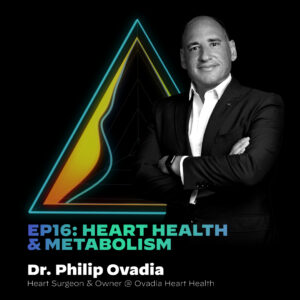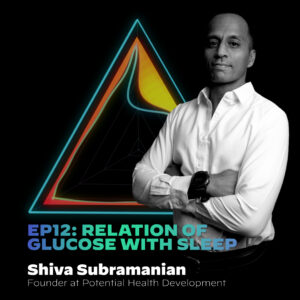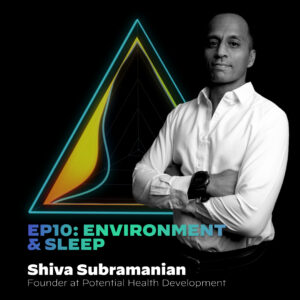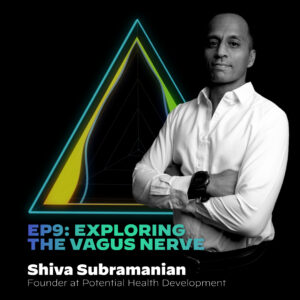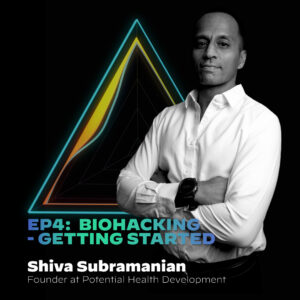Introduction of Podcast
We kickstart the first episode of The Ultrahuman Podcast with the founder, CEO of Ultrahuman and the host of the podcast, Mohit Kumar. He is joined by Shiva Subramanian, founder at Potential Health Development and they discuss the origins of metabolism and what it means in the modern context.
Timestamps
- (00:00 – 03:31) – Introduction
- (05:50 – 09:18) – What is Metabolic Health?
- (10:42 – 14:30) – Lifestyle Differences Between Present Day Man And Tribemen
Key takeways – Transcripts
Intro (Mohit): I am Mohit Kumar, founder, and CEO of Ultrahuman. In today’s episode, Shiva and I take on the basics of metabolic health. So, I got introduced to Shiva all most two years back by a friend and also via the Ben Greenfield podcast and I remember Ben mentioning that his socks were blown to see somebody in India taking biohacking to another level. I didn’t really believe in it until I actually met Shiva.
And what I realized is that the approach Shiva and his team were taking in terms of basically changing the game and on biohacking and not just biohacking, but environmental factors that affect your health. Anything that’s got to do with your soil to basically your nutrition, to the biomarkers you track, they have been actually changing the game every day here.
(Shiva): Thanks, Mohit. It’s always a pleasure talking to you. Actually, it’s quite simple. I actually come from a background from management and finance and a business background. But what that actually gives you is a critical ability to look at what profit or what you’re left with at the end of the day, right? And if you begin to look at health and the ecosystem of our living ecosystem and you’re able to look at it, we have to have objective data coming in. So around 15-20 years ago, I decided to look at health from a different perspective, say, not human centric, but looking at it from a data perspective. And if you look at it, we have to start with the human being from our food and then the food, thereby from the soil and water leading up to things like blood.
And as we get more into it, we then suddenly figure out that, hey, we only, like, got 1 trillion human cells, and the other 10 trillion are all microbial. So, then you’re like, wow, I better start testing what this whole microbiome stuff is all about, right?
Because you have genetics And if you begin to look at it like this, all of that becomes a huge model. It’s all interconnected, but it’s a model. And from a traditional corporate structure, it becomes very difficult to isolate that and say, am I running a genetics company? Am I running a sports science division? Am I running a performance division? Am I doing physiology? So, what we did is take all the specialists and actually come up with individual units, like, not an organization, but an organism very much like nature. And then from there, what we’re able to do is look at the specializations of each one of these. Look at the integrations of each one of these.
But let’s put all of this into a set based on real lifestyle changes, not clinical. The whole world has clinical people. We got some of the best guys in the world. But how do you migrate all that clinical knowledge into something that you can use every day? Right? How can you breathe it, live it, eat it? And the only way we can do this is to be able to show you very objectively what you’re changing, how you’re changing it, when you’re changing it and how it works for you individually. Because as you know, with the work that we do with Ultrahuman, that’s what you guys are doing as well. You’re taking this CGM and you’re able to give people this data that they’re constantly aware of. It’s sort of sentient, almost, right? To be able to make people change because at the end of the day, that’s what the game is about, right?
(Mohit): So, I think the interesting and this is really complex, right? This is too much to absorb in like one statement. But when you really think about it, health or human living is really complex, right? There are so many aspects to it. It cannot be monochromatic. It cannot be a uni dimensional when you really think about it, right? There are various layers to our existence and they’re still being discovered. And nutrition itself is sort of like a black box today. It’s so confusing out there, right? And then the world of fitness, it’s evolving. Like what is the right type of activity or movement level for individuals and what’s good for performance? What’s not good for performance? Taking a ground up, fundamental approach almost feels like a journey, not a destination. Like basically whatever it takes to help humans achieve peak performance or at least their peak performance, right? Is what you all are up to. And it almost seems like a mystery novel, right? That when you start reading it, you don’t know what you will uncover in various chapters. And these chapters could be about different aspects of your body. Like, basically your brain is a chapter. Basically, your hormone health is a chapter. Your muscular skeletal health is a chapter. For athletes, it could be something else. But then what you guys are really doing is that you’re actually creating this layer by layer and sticking to the cutting edge in terms of what all can be done to actually improve human performance on soil, not just directly from food, but actually starting from soil, which enhances the food, and then basically measuring and helping people understand more about their body and then creating further interventions from these. Like you mentioned, genetics, microbiome metabolites, and a bunch of these, right?
Question (Mohit): But let’s talk a little bit about health in general and specifically the domain of health, which is called metabolic health. When I started exploring and learning about metabolic health, the first question in my mind was why is this extremely new? Why did we suddenly start talking about hormone health recently? Why was this not a paradigm of health maybe just ten years back? I would love to understand from your perspective what really, first of all, is metabolic health? Why is this becoming like a recent topic?
Answer (Shiva): In my opinion, I think we have to go back to just discuss what metabolism is, right? Because when you say health, it’s a consequence of good metabolism. So, let’s just separate those two for a second and just look at what metabolism is. Metabolism is every chemical reaction in your body that will either break down units for energy or build up units for matter. So, in a way, it’s a continuum of energy. You get energy from the outside, the energy is consumed, broken down, so it’s accessible to you and then rebuilt. Because energy can either be transformed nor destroyed, right? I mean, energy can only be transformed. It can’t be destroyed. So, which means that you are part of that energy continuum. It’s actually a connection. Metabolism is actually a connection to the universe, to nature, to the environment, right? And you want to know something really interesting?
You know, metabolism comes from the Greek word which means ‘to change’. So, if you really look at it, what you’re actually talking about is your ability of your cells, your enzymes, your microbiota, to be able to utilize nature or products of nature, food, even things like sunlight and everything else that you interact with and make it into a usable form in your body. So, it could have some kind of impact to better or to build your purpose of whatever that is, right? I mean, it could be survival or it could be performance. It doesn’t matter. Metabolism is agnostic to that. It’s more about survival first and then performance later, obviously, which is why we’re seeing so many problems with metabolic health. We are no more a survival economy, and we were designed for that. We’re anachronism genetically from 150,000 years ago that we’re carrying around today. So, imagine Hunter gatherers walking around in a mall today. If you really think about that, that could go horribly wrong. Which is exactly what’s happening today, right? I mean, we’ve taken our tribal ethos genes and all of that, and suddenly we are in this world of plenty with, like, everything that’s, like, we’re over exposed to it. So why is it a recent phenomenon? Because metabolism was so taken for granted, we didn’t even have to think about it. It was the way we existed without thought.
Question (Mohit): Yeah. So the environment is evolving much faster than how we are evolving. So, there’s a mismatch, right?
Answer (Shiva): And if you think about the idea of what this metabolism is, the energetics of metabolism are all subconscious anyway. It’s all introception. It’s not something that you’re aware of is happening inside you, right? You’re only aware of the cognition and the thought process outside your heart is beating. The amount of amazing things that are actually happening inside you. It’s all happening without your conscious thought. So if it’s not happening in conscious thought, why would you pay any attention to it? You’re more worried about what I’m going to eat tonight or watch TV or do something else, or that you’re not going to really worry about all the magic that’s happening in your body because it’s a taken for granted thing. But you only start paying attention to it because something that you took for granted is now breaking down and it’s making you not enjoy or live optimally, which is now detrimental to you. So now you’re like, oh, we have to do something about this. It’s part of evolution as well, I suppose, right? And here’s what’s the most amazing part of this whole metabolic activity, is, you’re talking about how we break down things, right? How we break down things? Each person has a different way of breaking down things depending on their genetic blueprint. And you talked about why is it important today? I mean, in terms of metabolic syndrome, in terms of all of these other things that we’re looking at, I have a feeling that if you look at evolutionary anthropology, we’re designed not to move so much. We want to conserve energy. If you look at evolutionary anthropology, we want to get as much honey and fruit as possible so that we could see it through a lean period. You wanted to be fat, right? If you look at evolutionary anthropology, you wanted to get as much protein glutamate as possible because that would be what would help you build or grow bigger to survive, right? Now, you take all that same context and you look at the world and say that, wow, before there was only one King. Now every man is a King. He has more than anybody 100 years ago who would have been a man of means had because, yeah, so suddenly you are like, every man is a King. He’s like, you’ve got the best food. You’ve got things that you shouldn’t be able to get in your own country from every country in the world where it’s become a global food, basically buffet, if you will, right? I mean, we get Japanese food here. You can have sushi here. I mean, 20 years ago you couldn’t. Today you can.
(Mohit): Yeah. Every human has access to way more resources, and it’s increasing. It’s not actually at least for the top stack. It’s actually the density and the diversity is increasing. We consume way more types of food, have access to more resources, and our lifestyle has actually been pretty much the same. Actually, it has also changed, but in the favor of, let’s say lower levels of activity.
(Shiva): You’re absolutely right because, I think the average when they look at hunter gatherer tribes, like the Ismene or the Hadza or any of these tribes, what they found was that those guys were walking maybe between 10,000-15,000 thousand steps. Let’s put it in steps today because everybody’s got a FitBit, everybody’s got a Garmin watch or an Apple watch. So let’s take steps. And the average Western civilization actually does is like four or five thousand. And that’s like if you’re moving because what we’ve done now, let me give you the most interesting part of this whole thing is energy, right? We’re just talking about energy. So, what we define as energy today is a calorie. Actually, when we say calorie, it’s actually not a calorie because it’s a kilo calorie. That’s what we talk about. But there was a convention during the 1800s where they called a kilo calorie a calorie. And that’s why we even are not accurate with that. But since we’re discussing this and we are in the world of health, we should be specific about it. I’m saying kilo calories, right? So, when we say kilo calories, I’m saying that, okay, you have calories that you need as a hunter, gatherer, or even let’s go to animals, or mammal. Mammal means for every calorie, it expends, right? It’s going to get around 40 calories of food. Now, for every calorie that we consume, we have eight calories of energy consumed.
Let me put it to you like this, refrigeration, fossil fuel, all of that is energy. So, what you’ve done is reversed the whole process. And that’s why nothing on the planet is sustainable, right? Nature was designed to be within that realm. If you look at this, this guy called Herman Poncer basically did the calculations and came up with these things from various studies. And he’s like, look at our world. It’s gone topsy turvy. Now we spend eight calories to get one calorie of food, while before we would spend one calories to get 40 calories, because it would be walking, doing whatever you hunted, you were able to use the whole entirety of it. You were able to do it, right? So, if you look at the energy, I suppose deficit that we’ve created, it’s gone from here to here. Now you understand why we are burning through our resources. Because if you walk in and what is the cost of going to a store and getting food? Say that for this, I had to go and hunt or do whatever it is. After doing around like 400, 500 calories, I would be able to either hunt, gather, tubers, get honey, do something like that. And I’m not talking about Paleolithic diet or anything like that. I’m just saying we had to walk, we had to dig, you had to clean, you had to cook, you have to get the firewood for it.
Look at the amount of movement that you had to do. It’s not like that, they moved more than us per se. This is the other interesting fact. They didn’t move so much. If you moved naturally through the if you’re a postman or you had a slightly more physical job, you’d get the same amount of movement. 10,000 steps to 15,000 steps is not so much. It just shows you that we have cars, we have maids, you have all these other things that are happening for you, which you would have spent energy to consume. And right now, instead of spending that energy, that energy staying static in your body while you’re in a consumption economy, we call it, but also your body is in a consumption mode.
Outro (Mohit): Thank you, Shiva, for kickstarting this conversation on metabolism and for providing some great insights about metabolism. If you found this useful, please share this with your friends and family. If you have any comments or questions on topics we’re discussing, please tag us on our social handle @UltrahumanHQ on Twitter and Instagram. Thank you so much and we’ll see you soon.




